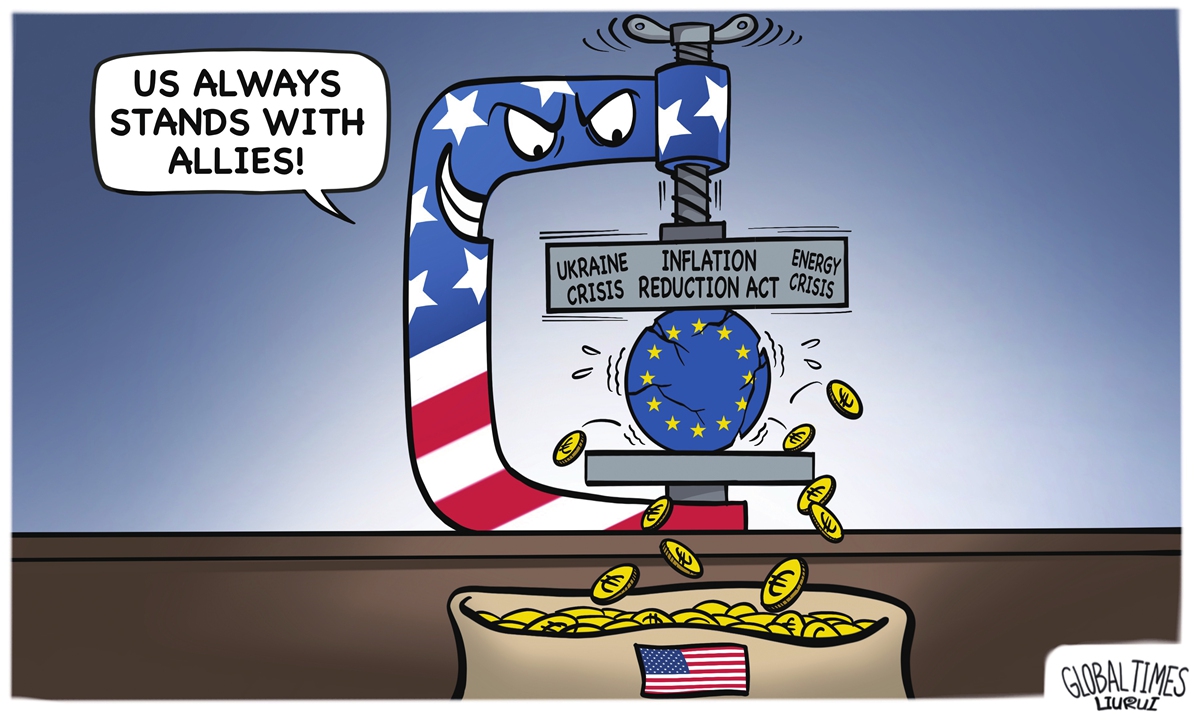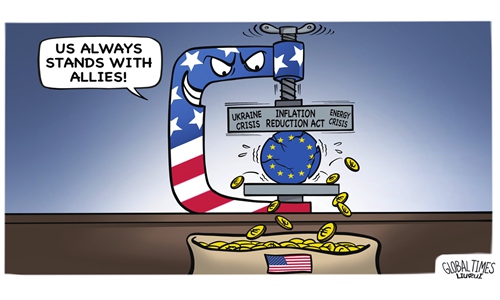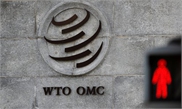
Illustration: Liu Rui/GT
After several months of silence, the 27-nation European Union has begun to recognize the true intentions of the Biden administration's much-trumpeted legislation passed by the US Congress, the so-called US Inflation Reduction Act (IRA). Taking the guise of an aggressive clean energy bill, the act is actually Washington's massive $430 billion new green energy subsidy package to lure high-tech manufacturing jobs back to the US.Similar to Donald Trump's import tariffs and quotas imposed on importing steel and aluminum, the IRA doles out generous tax credits to electric vehicles produced and sold in North America, with some American media putting the US government tax incentive at $7,500 grant for a single electric car made and sold in the US, Canada and Mexico.
Concerned that EU manufacturing plants could be lured away by the IRA, Many European governments are up in arms. On Sunday, European Commission President Ursula von der Leyen said the US law will cause serious trade "distortions". Under the IRA law, American consumers will be offered incentives to buy new and second-hand electric cars, to warm homes with heat pumps or to cook food using electromagnetic induction.
Deemed as protectionist and a grave threat to European jobs especially in the green-energy and automotive sectors, the US law runs counter to the WTO rules, and will erode free and fair market competition and place European and other countries' companies at a disadvantage.
As Washington doesn't care about the interests of other economies or respect "a level playing field" in global competition, the EU and other nations could also adjust their rules on state aid and choose to subsidize their own enterprises.
French President Emmanuel Macron, when visiting the US last week, raised the "problematic" IRA during his talks with President Biden, who briefed reporters that "there could be tweaks to be made" on the US law to make it easier for EU companies to benefit from the US government subsides. However, even Biden's fellow Democrat lawmakers in the US Congress have publicly refused to amend the act, not to mention the Republicans.
If the row across the Atlantic linked to the IRA keeps escalating, there is a possibility that the EU may bring the dispute to the WTO for a formal complaint review and settlement, which may involve tough bargaining or even tit-for-tat between the two major economies. Whether they could avoid another trade war and overcome an accelerating governmental subsidy race between them remains to be seen by the world.
By all metrics, the IRA explicitly giving generous tax breaks to the green high-tech manufacturers on the condition they are made in North America only is untenable in light of internationally observed rules. It's a highly protectionist practice to shore up the US' own interests.
The EU is likely to take some rebalancing measures to smooth out the "distortions" of competition caused by the massive American subsidies enabled by the IRA. For sure, the transatlantic dispute is likely to take center stage in the upcoming interactions between European and American policymakers, possibly at the expense of previous avowed ambitions for broader and deeper economic cooperation across the Atlantic.
There is justification for longstanding concerns that the transatlantic trade and economic partnership is not living up to its potential in a fast-changing global environment, including the Biden administration's thinned-veiled inheritance of Trump's "America First" foreign policy and the US government's increasingly relentless moves of economic and technology coercion to hold back China's growth.
For example, like the doomed TPP deal, the ill-fated Transatlantic Trade and Investment Partnership (TTIP) experiment demonstrated the potential of deepening transatlantic trade, but its collapse in 2016 gave a clear warning to many around the world: trade is no longer perceived as a positive-sum game by Washington because it does not always benefit "America First". Following this logic, the former Trump administration launched an unprecedented tariff war with China, a conflict which the Biden White House has only paid just lip service to halting.
All the more, the Biden administration earlier this year brazenly started to cut off global semiconductors supply chain in order to impede Chinese high-tech manufacturing. And it has been persuading the EU to take a similar approach to "decouple" from Chinese economy.
In a nutshell, Washington, driven by sheer selfishness, will continue to enact laws or restrictive regulations like the IRA or high-tech embargos to disrupt and fragment global supply chains, as long as it believes free and undisturbed trade is no longer in its interest. It wants to shred the integrated global economy and the globalization process into pieces, in its bid to prolong its superpower status and continue to suppress other economies, be it EU or China.
The author is an editor with the Global Times. bizopinino@globaltimes.com.cn



